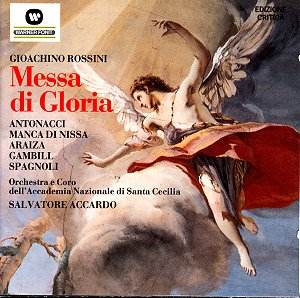Philip Gossett's excellent booklet notes trace the
musicological history of this work. Rossini's 'Messa di gloria' was
performed in the Church of San Ferdinando, Naples, in March 1820. Only
one page of the original manuscript exists (in Brussels), but a complete
set of parts lies in Naples Conservatory, and this latter formed the
basis of the current edition.
There are two movements for a solo tenor, each intended
for a different performer: the 'Gratias' (high and florid) and the 'Qui
tollis' (powerful and set lower in the tenor register). Gossett suggests
that Rossini was 'helped' by another hand in the contrapuntal sections
and that the final section, 'Cum sancto spiritu', was composed by Pietro
Raimondi. This movement certainly seemed to stick out to the present
writer, and my notes (written before I was aware of the Raimondi factor)
refer to a 'stiff old fugue', a 'dour affair' and conclude with the
phrase, 'What a shame'.
The 'Messa di Gloria', Rossini's only work written
during the period he wrote for the theatre and the first sacred work
of his maturity, is generally well-served on this disc. Much is thoroughly
Rossinian and it comes as no surprise that a theme from the 'Gloria'
reappears in both the Overture and the Second Act Finale to the opera,
'Le Siège de Corinthe'. Indeed, the whole thing takes some getting
used to because a lot of Rossinian fingerprints one is used to hearing
emerge from the opera pit here turn up in a liturgical context.
The 'Kyrie' is painted with dramatic brush-strokes,
and much of the woodwind writing is immediately recognisable as from
this source. There is a lovely cor anglais solo in the 'Gratias' and
a very musical (if somewhat edgily-toned) clarinet solo in the 'Quoniam'.
The 'Gloria' is presented as a juxtaposition of a chorus
of angels with a chorus of joyful shepherds (jaunty as only Rossinian
shepherds can be): if you do not expect the dizzy heights of the 'Gloria'
from Beethoven's 'Missa solemnis', then you will not be disappointed.
Accardo has amassed a fine line-up of soloists. Anna
Caterina Antonacci is a sure, florid soloist in the 'Laudamus,' but
it is the range and beauty of Bernadette Manca di Nissa's mezzo in the
'Domine Deus' that impresses.
Francisco Araiza, who has previously recorded this
work, is an effective soloist, coping with th difficult lines well.
The bass, Pietro Spagnoli, does not have a big voice, which perhaps
is just as well.
Salvatore Accardo, leaving his violin in its case,
proves a committed advocate. Perhaps this is a labour of love for Maestro
Accardo? Tempi seem natural and convincing, and balance is carefully
considered. More depth to the recording itself would have been welcome,
but the disc remains worthy of investigation at the price. It is a worthy
companion to Neville Marriner's account on Philips 434 132-2.
Colin Clarke


